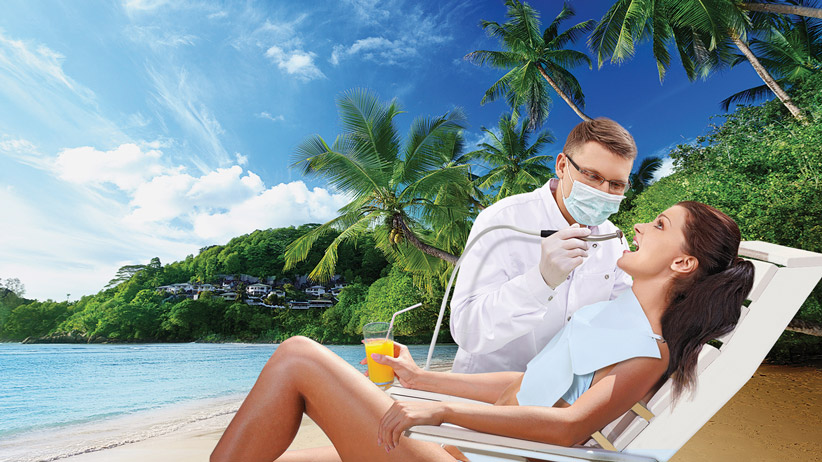For most people, the annual summer break is a time for rest, relaxation and roping in the family for an enjoyable holiday. For others however, it represents peak season for international dental tourism.
The kids are off school, businesses are operating at a slower pace and the weather all over Europe is at its best. So it’s hardly surprising that this tends to be the time that many dental tourism patients decide to make their respective moves.
Contrary to popular belief, medical tourism in general isn’t necessarily a bad thing. In fact, there are plenty of experts who actively recommend it to their clients and patients. Though it’s commonly assumed that healthcare standards are inferior overseas, this simply isn’t the case at all. Tens of thousands of private practitioners all over Europe are providing equal, if not better dental care standards than would be expected in Great Britain.
It’s just a case of ensuring that you make the right decision, when deciding who to entrust with your health and wellbeing.
So given the annual summer uptick in the number of patients considering dental tourism, we thought we’d once again take a look at a few important considerations. Staying safe is all about common sense and proactivity, rather than taking any chances at any time.
Dental Tourism: General Standards
First and foremost, general standards in overseas dental services differ enormously between countries, cities and individual clinics. It’s never a good idea to simply make assumptions about every given care provider, in accordance with the country in question. Every country has its own contingency of high quality and substandard dental clinics – taking things for granted therefore never being a wise move. With matters as important as this, there is no such thing as carrying out too much research and making as many comparisons as necessary, before going ahead. On the plus side, the Internet has made it easier than ever before to find out all you need to know about any international dentists you may be considering paying a visit to.
Dental Tourism: Language Issues
Just because the dentist you are considering has a website presented in perfect English does not mean that they or any of their staff speak more than a few words of the language. For obvious reasons, language barriers can be a particular problem when it comes to any kind of treatment or healthcare. The simple fact of the matter being that if you cannot communicate freely and clearly with your service provider, it is not a service provider you should be dealing with. You may be offered the services of a translator, but for obvious reasons this is going to incur significantly greater costs. Always make direct enquiries, in order to assess the potential for language barriers.
Dental Tourism: Recovery
One of the benefits of working with a local dentist is the way in which they can be contacted at any time after any given procedure. During the recovery period, you may find yourself with any number of questions or concerns, which you would prefer to have addressed as quickly as possible. In such instances, proximity to the dentist plays a role. Which is precisely why it can be slightly less reassuring to know that your dentist is located thousands of miles away. It’s not to say that international dentists cannot and will not offer plenty of support and aftercare – it’s just that dental tourism mean sacrificing a certain amount of convenience.
Dental Tourism: AdditionalCare
Not only this, but it is inevitable that you are going to need any number of follow-up examinations after the procedure has been carried out. This is to ensure that the healing process is going as it should and that any potential problems are detected as early as possible. When working with a local dentist, such follow-up examinations and access to the required advice are readily available and convenient. By contrast, it may be fundamentally impossible to attend any such follow up appointments with an international dentist. They may advise you on the best electric water flosser to use after surgery, a high-quality mouthwash for after dental surgery and generally how you should go about eating, drinking and living during the recovery process. But what they cannot do is immediately transport you to their office, should you encounter any problems during the recovery process.
Dental Tourism: Hidden Extras
Last up, it’s important to scrutinise any costs and quotations communicated by an international dentist you may be dealing with. For the most part, dental professionals working overseas are every bit as honest and trustworthy as those practicing in the United Kingdom. Nevertheless, there are also plenty who will go out of their way to bring any number of additional charges and costs into the mix. None of which may have been indicated at the time you made the arrangement. Once again however, it is usually easy to determine the honesty or otherwise of any given service provider, simply by checking out the reviews and recommendations of their past and present clients. For obvious reasons, it’s never a good idea to put your trust in those that do not have sufficient feedback to verify their reputation and stature.
Ask the Experts…
If dental tourism is something you’re genuinely interested in but have your concerns about, there’s no reason why you cannot speak with your current dentist. If there’s work you’d like to have carried out but simply cannot afford to pay UK prices, your dentist may be willing to offer their own advice and guidance as to the options available to you.
In any case, it all comes down to the point raised several times above – research is everything. Unless you can comprehensively verify the quality, capabilities and professionalism of the dentist in question, summer dental tourism could represent a risk not worth taking.
